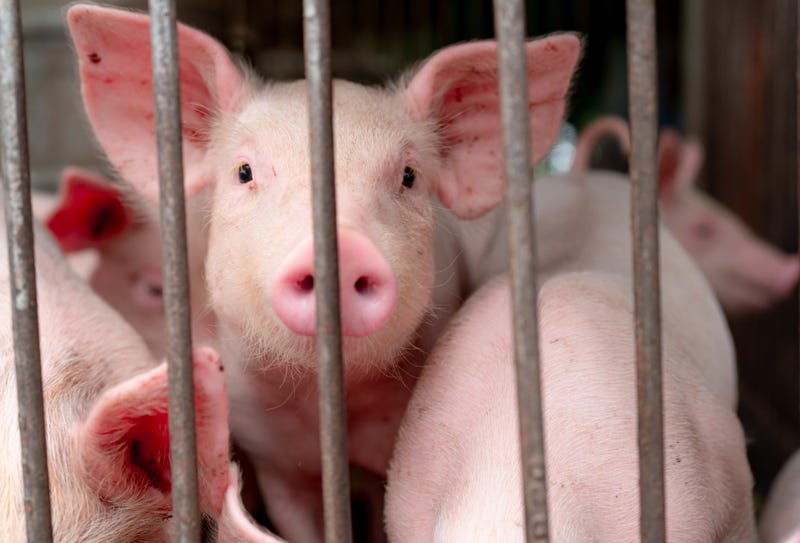
OAKLAND COUNTY (WWJ) - A child in Lapeer County has likely contracted the nation's first case of swine flu this year after coming into contract with sick pigs during the Oakland County Fair earlier this month.
The Lapeer County Health Department confirmed the resident's test came back positive for an influenza A H3 strain of the virus, not long after pigs from the fair were also diagnosed with the disease.
The child was only identified as under the age of 18 and was an exhibitor at the fair. The presumptive positive test is being sent to the CDC for additional confirmation.
If that is confirmed, the Lapeer County resident would be the first U.S. human case in 2023, said Chelsea Wuth, a spokesperson for the Michigan Department of Health and Human Services, told the Detroit Free Press.
Officials with the Michigan Department of Agriculture and Rural Development and the Department of Health and Human Service said a number of pigs began showing symptoms of the virus on July 14.
The fair ran from July 7 -16 at Springfield Oaks County Park in Davisburg.
Oakland County Fair GM LC Scramlin told FOX2 that its a scenario that's never happened during the event before and took swift action when the sick pigs were discovered.
"We closed down our hog exhibit to everyone just the bare minimum of people who need to take care of the pigs," he said.
Scramlin explained a reginal state veterinarian swabbed 76 animals the morning of July 15 and by dinnertime, they knew that the pigs were infected with swine flu.
"We had to check each pig's temperature in order to discharge them from the fair and some stayed with us until Wednesday after the fair until we had all of their symptoms passed," Scramlin said.
Fair organizers said they following state and county regulations when the outbreak was determined. All protective measures were enacted and no one else except the child have so far contracted the disease.
"The swine flu is of course, well can be, passed on to humans and so it is very much your typical flu symptoms but they want anybody that exhibits that actually contact their local physicians if they come down with any of those symptoms," Scramlin said.
Anyone who was determined to have been in contact with the barns that housed the pigs or with pig exhibitors have been contacted by the Oakland County Health Division to help identify other people who may have been exposed.
Local healthcare providers have been told to watch out for patients who are having respiratory symptoms and have come into contact with pigs or attended the fair.
“Visitors of the Oakland County Fair should monitor for flu-like symptoms: fever, respiratory symptoms like cough and runny nose, and body aches, nausea, vomiting or diarrhea,” Dr. Natasha Bagdasarian, the state's chief medical executive, said in a statement. “If you believe you may have the flu, contact your health care provider and stay home until you have recovered.”
Symptoms of swine flu include:
• Fever
• Respiratory symptoms, such as cough and runny nose.
• Body aches.
• Nausea, vomiting or diarrhea.
State officials warned that influenza viruses, which include swine flu strains, are known to occasionally cause severe disease, even in healthy people, such as pneumonia, which can lead to hospitalization and, in some cases, death.
Children younger than 5, people 65 and older, those who are pregnant and those who have health conditions such as asthma, diabetes, heart disease, weakened immune systems and neurological or neurodevelopmental conditions are most at risk of complications from the disease.
"Pigs may be infected with swine influenza viruses that are different from human flu viruses," state health officials said. "Swine flu viruses spread among pigs and – while rare – they can spread from pigs to people too. Spread of swine flu viruses from a pig to a person is thought to happen in the same way that human flu viruses spread; mainly through droplets when infected pigs cough and sneeze."
Below are some steps you can take to protect yourself and prevent the spread of any illness:
• Avoid close contact with sick people
• Cover your nose and mouth with a tissue when you cough or sneeze. Throw the tissue in the trash after you use it
• Wash hands often with soap and water. If soap and water are not available, use an alcohol-based hand rub
• Refrain from eating or drinking in livestock barns or show rings
• Do not take toys, pacifiers, cups, baby bottles, strollers, or similar items into pig areas
• Anyone who is at high risk of serious flu complications and planning to attend a fair should avoid pigs and swine barns
• Avoid touching your eyes, nose, and mouth. Germs spread this way
• If you are sick, stay home from work or school until your illness is over
• Avoid contact with pigs if you have flu-like symptoms. Wait seven days after your illness started or until you have been without fever for 24 hours without the use of fever-reducing medications, whichever is longer
• Get an annual influenza vaccination
The time period it takes from exposure to illness for variant influenza is similar to that of seasonal influenza, which can be up to 10 days, but is most commonly three days.
At this time, there is no vaccination for swine flu and the seasonal flu vaccine will not protect against the disease.
An effective treatment for humans who contract the virus is prescription antiviral drugs, such as oseltamivir and zanamivir. Early treatment works best and may be especially important for people with a high-risk condition.
For more information, visit CDC.gov/SwineFlu
